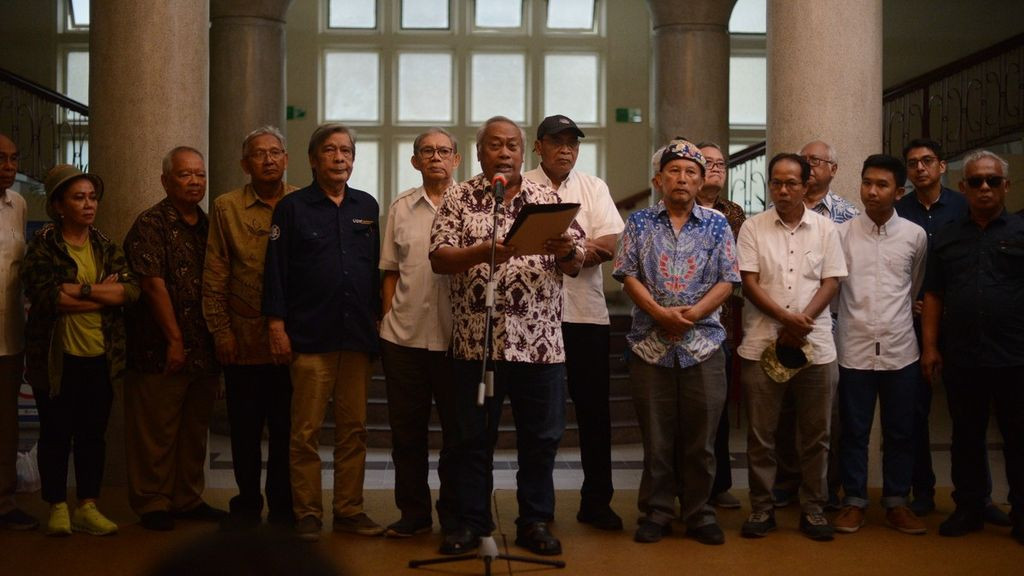Popular Reads
Top Results
Can't find what you're looking for?
View all search resultsPopular Reads
Top Results
Can't find what you're looking for?
View all search resultsMoral movement
When the leader of a nation has no qualms about showing off his moral ambiguity, how can we expect the rest of government to maintain higher standards?
Change text size
Gift Premium Articles
to Anyone

Over the past week, we have witnessed a surge of fresh criticism of President Joko “Jokowi” Widodo’s government and the political elite ring through the halls of campuses and centers of intellectual thought across the archipelago.
Dozens of universities and higher education institutions, represented by hundreds of professors, lecturers, student activists and alumni, have spoken up about the need for the country’s rulers to return to the path of democracy.
Many of them underline the importance of fair and honest elections and good governance for a healthy democracy, while others have to varying degrees reminded Jokowi to stay in his lane ahead of next week’s presidential election, one he is barred from contesting for a third time.
It is perhaps telling and apt that these public expressions of grief and disappointment started at Gadjah Mada University (UGM), Jokowi’s alma mater.
In an open letter to Jokowi and the ruling class known as the Bulaksumur Petition, scholars of the university bemoaned the “deviant” actions perpetrated by an otherwise esteemed member of the UGM family. Bulaksumur refers to the area where the UGM campus sits.
“Instead of practicing his filial duty to his alma mater by upholding Pancasila and striving to realize the values enshrined within it, President Jokowi’s actions have instead exhibited a deviation from the principles and morals of democracy, peoplehood and social justice,” said Koentjoro, a professor of psychology at UGM, who read aloud the petition in Yogyakarta on Jan. 31.

Since then, other campuses and academic institutions have joined the chorus of grievance about the moral decay and erosion of democratic culture, the blatant partisanship and the irresponsible use of state resources for political gain.
And while the Presidential Palace has shrugged off the warnings as mere noise ahead of an election, they have not come out of the blue in the final stretch of the campaign season.
On the contrary, their opinions are very timely.
For many months – years, even – local scholars took a back seat to pro-democracy activists in voicing concerns about the elections, mostly as a symptom of the limits of their moral authority in the face of a regime that has demonstrated a proclivity to stonewalling and quashing dissent.
The debate on Sunday merely hinted at the shortcomings in our higher education sector and its overreliance on the ever-churning pace of late-stage capitalism.
But for many, the Constitutional Court ruling in October, which paved the way for Jokowi’s son Gibran Rakabuming Raka to run alongside Defense Minister Prabowo Subianto as his vice presidential candidate was the last straw, and there was no excuse for academia not to take a stand.
When the leader of a nation has no qualms about showing off his moral ambiguity, how can we expect the rest of government to maintain higher standards?
And so, the recent “intellectual uprising” comes as a reminder of the role that campuses once had in the Reform movement that ousted strongman Soeharto in 1998.
Even under a clearly authoritarian regime, campuses at the time were the lifeblood of revolutionary thought. They carried the voices of the people but also of common sense. Student activists helped Indonesia reach a path toward becoming a better democracy in the decade that followed.
During the New Order, it was campuses and the students of the time that galvanized pressure to end corruption, collusion and nepotism and bring about our hard-won democracy.
Now we come full circle some 25 years later, when campuses may once again rise up against the government for very similar reasons.
Many of these institutions warn of large consequences on the horizon if the country strays further from democracy.
It will be solely up to Jokowi to heed or ignore these calls.










